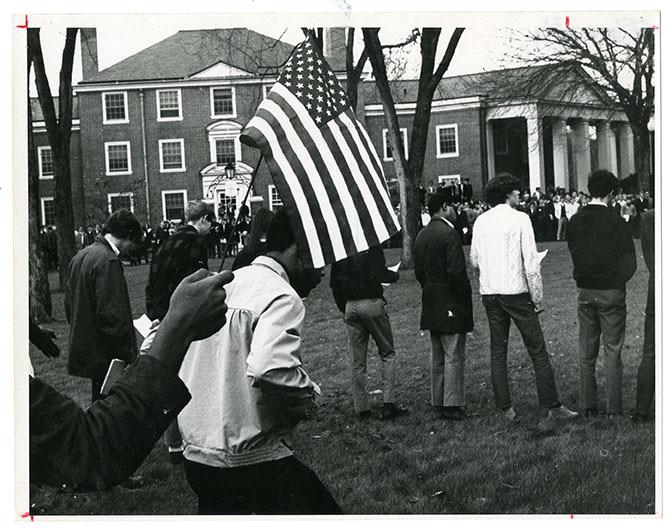Following the viral video of George Floyd’s killing at the hands of police, protests have erupted across the nation in response to police brutality. Along with the outcry against violence, our country has begun to grapple with the realities of systemic racism — a form of oppression that is inherently built into our country’s framework.
As Nicholas Kristof discussed in his recent New York Times op-ed, while imagery has been a powerful element in the Black Lives Matter movement, we are not exposed to viral videos that highlight all of the systemic forms of racial oppression that plague our society. It takes more cognitive labor to interrogate the fact that Black individuals are dying from COVID-19 at twice the rate as white individuals, for instance.
So, as we begin to grapple with how to address and change this gruesome reality on a national level, the Editorial Board of the Old Gold & Black believes that this conversation also has to take place within the Wake Forest community. Our university is a predominantly white institution (PWI) with, for example, 68.8% of the class of 2022 identifying as white and only 5.4% identifying as Black, according to the most recent entry data provided by the university. Even further, only 6% of Reynolda campus faculty are Black professors, according to 2018 data, and out of an 18-person staff there is only one Black assistant dean in undergraduate admissions. Consequently and unsurprisingly, our PWI has been host to a series of race related incidents.
More recent examples include multiple departments and offices on campus receiving an email threatening people of color and the LGBTQ+ community in 2019, a racist Instagram post from 2019 that called for a wall to be built between Wake Forest and Winston-Salem State University, a historically Black institution, a student who called her resident advisor a racial slur in 2018 and a bucket of urine being left outside the associate chaplain for Muslim life’s office in 2014.
Apart from singular events such as these, photos have been uncovered of individuals in blackface in the Howler. Similarly, Senior Assistant Provost Martha Allman and Associate Dean of Admissions Kevin Pittard, both alumni of the university, appeared in photos in front of a Confederate flag with members of Kappa Alpha Order in the 1980s.
President Nathan Hatch has responded to each of these incidents with messages addressed to the Wake Forest community. In following through with his no more than adequate statements, some laudable actions have occurred — these include the creation of the President’s Commission on Race, Equity and Community, the establishment of the Slavery, Race and Memory Project and the Committee on the Intersection of Bias, Expression and Conduct. Each of these bodies are actively working to improve Wake Forest, under the “Community in Progress” initiative. Similarly, at the most recent Founders’ Day Convocation, Wake Forest apologized for benefiting from slavery. Further, although it was not able to take place this past semester, faculty were slated to spend April 23 in an inclusive pedagogy conference.
Most recently on June 9, Hatch shared the findings of the Commission on Race, Equity, and Community with the Wake Forest community. The thoughtfulness and holistic approach taken by the group in addressing the experience of Black and brown students is clearly reflected in their 20 robust recommendations for action — including building deeper relationships with the Winston-Salem Community, strategically recruiting and retaining minority faculty and returning the use of the Barn for social events. Every student at Wake Forest should read their Executive Summary, which addresses the complexities of dismantling institutional racism and the commission’s desire to follow through with these recommendations. Additionally, the Editorial Board applauds the university for their hiring of Dr. Corey D. B. Walker to chair the inaugural African American Studies program, as well as the creation of the Center for Research, Engagement and Collaboration in African American Life, which will be spearheaded by Dr. Derek S. Hicks.
In acknowledging the commission’s work, the Editorial Board is looking forward to seeing the university adopt each of these policy recommendations through the working groups that will be established in September. However, we also believe that administrators should take one step further in adopting the ideas originally brought forth in 2019 by the Anti-Racism Coalition (ARC) and Wake Forward, a progressive alliance of faculty, that have not yet been addressed. Specifically, the Editorial Board implores the university to begin taking tangible steps in creating a zero tolerance policy for white supremacy on campus.
Although we acknowledge that the implementation of this policy will require hard work and great care, it would be and has been irresponsible of the university to not even try. Specifically, the Committee on Bias, Expression and Conduct should be actively working towards this goal right now as they hone their skills in responding to bias reports. If the university continues to circumnavigate a zero tolerance policy as it attempts to address institutionalized racism, it will most simply show that they are not meeting the moment, but more poignantly highlight that our campus is not as safe as it can be for students of color. To continue, the university should also acknowledge and respond to the petition started by students for “increased education on race, prejudice and privilege,” and incorporate it into their response to the recommendations supplied by the commission on Race, Equity and Community.
That being said, it is not just up to the university administrators and faculty to make these changes. Students must not only demand change, but follow through with their demands. Before Black Lives Matter was trending on social media, ARC, as well as individual students of color at Wake Forest, consistently asked both the administration and their peers to address and uproot racism from our school community and adopt anti-racist mentalities and policies. They held a speak out and organized to work with the administration, with little support from white students at Wake Forest. The Editorial Board of the Old Gold & Black calls upon all students, but especially our large population of white students, to actively support them in their efforts.
When Ibram X. Kendi came to Wake Forest to discuss the topic of anti-racism for the annual celebration of Martin Luther King Jr. Day this past semester, Wait Chapel was not overflowing with white students. Wake Forest has always offered courses that cover issues relating to Race in America, and these classes span multiple departments and can fulfill a variety of divisional requirements. We call upon our white peers to be proactive in taking these courses, but we must acknowledge that many have not. So clearly, if a student has not taken advantage of these classes, the university should hold them accountable to a minimum requirement — one that asks them to both learn of their own privilege (or lack thereof) and the history of Wake Forest as a PWI (as described in the petition).
Within the journalism community, there is currently a conversation surrounding what it means to be an activist versus a journalist, as well as how to report on these protests in an unbiased fashion. On another note, we have seen journalists attacked, permanently injured and arrested by police in these protests. With this in mind, the Editorial Board of the Old Gold & Black acknowledges the power that journalism has to affect change and that neutrality is not always the noble or ethical decision.
In these staff editorials, we have applauded students for their philanthropic work, as well as asked them to do more in addressing climate change. We will continue to use our platform to share the board’s opinions and, in this case, we believe that the Wake Forest community needs to start making real, tangible changes to address the presence of institutionalized racism at our university.
Beginning on our end, we must acknowledge the lack of diversity within the Old Gold & Black’s Editorial Board. While we have always strived to uphold the voices of all students in our community, we must and will work harder to build up a diverse coalition of students to spearhead this publication moving forward. Similarly, we will continue to use our platform to cover issues of race and racism on our campus moving forward. Specifically, over the next few weeks, we will work to report more closely on Wake Forest’s response to this national call for change — as well as how students and faculty are responding across the country.
To approach these issues with earnesty and fervor, white students at Wake Forest must be intentional and undeterred in their efforts to create equity and fully address our university’s relationship with racism, past and present, and specifically adopt anti-racist policies. It is not solely the job of our peers of color to affect change, and it most definitely won’t be done if they are not supported with the same energy that many white students are feeling right now in response to police violence.
This has been a momentous week, not only in our nation, but for our campus community. In acknowledging this, it becomes clear that there is no room for emails void of a call to action, there is no room for apathy and there is no room for the continued avoidance of real change.













pornlist • Jun 16, 2020 at 4:28 am
This is a good blog, happy every day
TD • Jun 14, 2020 at 1:44 pm
Sometime between the fall of 1968 and the spring of 1969 when I was
at Wake I had published in the OG&B a short letter to the editor
asking why there were so few Black faculty members. That got me called
down to Dr. Scales office where the president explained to me that the
demand for Black faculty members at colleges and universities was
exceeding the supply,
I assume this is no longer the case. Accept no excuses now.
Tom Daly ’69
Hank Wordsworth • Jun 12, 2020 at 5:19 pm
I blog for alt-right academic publications in my spare time, chiefly the Occidental Observer. As I look back, my gateway into this activity began with my reading of the complete works of Karl Marx and Sigmund Freud while a student at Wake Forest and my transformation into a teenaged communist/psychoanalyst that would have made even the Frankfurt School proud. Complicating my revolutionary consciousness and critique, however, was a schizophrenic prodrome which the stress and frustration of my life eventually flushed out via a massive nervous breakdown in my early 20s. The final result, after a five-year process of reintegration, was not just sanity but super-sanity, slightly attended by a sporadic though tolerable bisexuality. Thus, having been on your side (and probably more widely read in it), it would be easy for me today to deconstruct your argument for the utter caricature of arid pecksniffery it really is, a summons for clear intelligence to think on its knees. But as people were gracious with me I should be gracious with you and allow experience to catch up with your many, many received opinions. As a first step in that direction, I commend to you and Dr. Hatch a nightshift delivering pizzas to the Southside of Chicago.